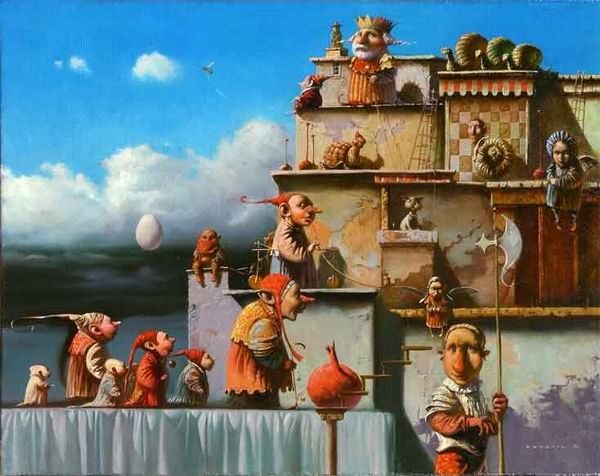
The Day Petrosian Failed to Smell Danger: A Stunning Tactical Upset
The "Iron Tigran" had reputation as the hardest player to beat in the entire history of chess. Fischer and Kasparov acknowledged Petrosian's near-invincibility. Fischer, who defeated Petrosian in their 1971 Candidates Match, noted that Petrosian's positions were so solid that finding a way to attack was like punching a wall. Kasparov later wrote in My Great Predecessors that Petrosian's ability to "smother" opponents' ideas was unique.
His positions were solid, yet flexible and dynamic. He could shift between defense and counterattack seamlessly, catching opponents off guard. As Kasparov noted, "Petrosian's games require a different kind of appreciation—they are like a slow-burning fire."
Petrosian had an uncanny ability to anticipate tactical and strategic threats long before they became apparent to his opponents. His games frequently featured moves that thwarted his opponent's tactical ideas before they could be executed. This made it difficult for aggressive players to find concrete targets, as Petrosian would already have safeguarded critical points in his position.

People considered Petrosian to be a positional player, but in reality he was a great tactician. Spassky, who played two championship matches with Petrosian, said that first of all, his opponent was a stupendous tactician. In the analysis room, and in blitz games, Petrosian's abundant tactical skills were apparent to everyone.
Yet, the game I'm sharing with you today, game 8 from the 1969 Petrosian-Spassky World Championship match, is a manifest of human chess player's fragility where the sense of danger can fail even one of the greatest, in this case the legendary Petro with his unmatched ability to sense danger and take precautions. This is highlighting the shock of his tactical oversight in this game.
A word about the importance of studying classical games. Yes, it does seem to be the superior way of learning for those who are still building their understanding of the game. And not using chess engines.
Classics in chess, arts, literature, and other fields offers foundational insights that remain relevant across time. In chess, classics like Morphy’s or Capablanca’s games teach timeless principles—control of the center, piece coordination—that underpin modern strategy. In arts, works like Michelangelo’s sculptures or Bach’s compositions reveal techniques and emotional depth that inform contemporary creativity. Literature, from Homer to Dostoevsky, sharpens critical thinking and exposes universal human struggles, enhancing empathy and cultural awareness.
Classics provide a shared language and context, connecting past to present. They’re not just relics; they’re tested frameworks for innovation and understanding. Ignoring them risks reinventing the wheel without the wisdom of what’s already been mastered. Plus, they’re often just damn compelling—there’s a reason they’ve endured.
Below is position after Petrosian played Be2-d3. Carried away by the plan for the best placement of his men, the world champion forgets about the possibility of a tactical blow. Such oversights are rare in Petrosian's play, but their shocking effect is all the greater.

As already mentioned, Petrosian would always properly safeguard critical points in his position. The key d4 point, the strongest in White's position (the Center of Gravity, as Carl von Clausewitz would call it) is defended three times! It would seem to belong to White forever. This may be a likely explanation for his attention to slacken. The dramatic moment of cracking the Unbreakable!
The oversight influenced not only the outcome of this game, but also the further course of the match.
 How did Spassky (Black) punish Petrosian's tactical oversight here?
How did Spassky (Black) punish Petrosian's tactical oversight here?
.
 The 10th world champion has definitely been underrated. An incarnation of the kind of player of Dr Lasker in the evolution of chess. A player of universal style and a brilliant psychologist in one person. He was simply unfortunate to be overshadowed by two other bright stars who appeared in the chess sky along with him in the 1950s, Tal and Fischer.
The 10th world champion has definitely been underrated. An incarnation of the kind of player of Dr Lasker in the evolution of chess. A player of universal style and a brilliant psychologist in one person. He was simply unfortunate to be overshadowed by two other bright stars who appeared in the chess sky along with him in the 1950s, Tal and Fischer.
.
Here's the game of Petrosian's rare tactical blind spot when his famed caution faltered [I've used the commentary from the Petrosian-Spassky 1969 book by GM Isaac Boleslavsky (Petrosian's second in the match) and GM Igor Bondarevsky (Spassky's second) where both assistants give their extensive parallel commentary of unparalleled depth and insight, a true hidden gem for all those who aspire to deepen their understanding of chess. Pity, the book as far as I'm aware of has never been translated to English]

A very rare example when the famously known Petrosian’s fortress of prophylactic genius and defensive mastery was breached.
.

.
.

